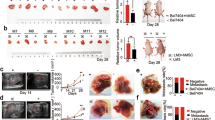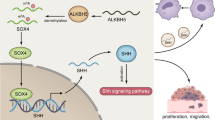Abstract
CD24 is known as a cell surface molecule in hematopoiesis and also described as a diagnostic marker for tumors. Previous studies suggested the important role of CD24 in hepatocellular carcinoma (HCC) pathogenesis. However, precise functions of CD24 in HCC are still unknown. Here, we found that CD24 is highly expressed in HCC both in mRNA and protein levels. Further, the epithelial-mesenchymal transition (EMT) and Notch1 signaling activations mediated by CD24 were elucidated as potential mechanisms of HCC promotion in Hepa1-6/Hepa1-6-CD24 cell models. Additionally, possible systemic immune reaction was explored through immune cells and Hepa1-6/Hepa1-6-CD24 cell co-culture. We demonstrated that the EMT process of HCC cell was effectively induced by CD24; also, the tumor immune microenvironment was changed by facilitating Notch-related EMT in vivo. These results reveal the underlying link between the HCC processes mediated by CD24. Moreover, as a clear tumor promoter, CD24 is considered a potential new target for HCC treatment.






Similar content being viewed by others
References
Springer T, Galfre G, Secher DS, Milstein C. Monoclonal xenogeneic antibodies to murine cell surface antigens: identification of novel leukocyte differentiation antigens. Eur J Immunol. 1978;8:539–51.
Sagiv E, Arber N. The novel oncogene CD24 and its arising role in the carcinogenesis of the GI tract: from research to therapy. Expert Rev Gastroenterol Hepatol. 2008;2(1):125–33.
Tan Y, Zhao M, **ang B, Chang C, Lu Q. CD24: from a hematopoietic differentiation antigen to a genetic risk factor for multiple autoimmune diseases. Clin Rev Allergy Immunol. 2015. doi:10.1007/s12016-015-8470-2.
Liu JQ, Carl Jr JW, Joshi PS, RayChaudhury A, Pu XA, Shi FD, et al. CD24 on the resident cells of the central nervous system enhances experimental autoimmune encephalomyelitis. J Immunol. 2007;178(10):6227–35.
Fang X, Zheng P, Tang J, Liu Y. CD24: from A to Z. Cell Mol Immunol. 2010;7(2):100–3.
Fujikuni N, Yamamoto H, Tanabe K, Naito Y, Sakamoto N, Tanaka Y, et al. Hypoxia-mediated CD24 expression is correlated with gastric cancer aggressiveness by promoting cell migration and invasion. Cancer Sci. 2014;105(11):1411–20.
Naumov I, Zilberberg A, Shapira S, Avivi D, Kazanov D, Rosin-Arbesfeld R, et al. CD24 knockout prevents colorectal cancer in chemically induced colon carcinogenesis and in APC (Min)/CD24 double knockout transgenic mice. Int J Cancer. 2014;135(5):1048–59.
Sadot E, Kraus S, Stein M, Naboishchikov I, Toledano O, Kazanov D, et al. CD24 gene polymorphism—a novel prognostic factor in esophageal cancer. Int J Biol Markers. 2014;29(1):e49–54.
Moulla A, Miliaras D, Sioga A, Kaidoglou A, Economou L. The immunohistochemical expression of CD24 and CD171 adhesion molecules in borderline ovarian tumors. Pol J Pathol. 2013;64(3):180–4.
Petkova N, Hennenlotter J, Sobiesiak M, Todenhöfer T, Scharpf M, Stenzl A, et al. Surface CD24 distinguishes between low differentiated and transit-amplifying cells in the basal layer of human prostate. Prostate. 2013;73(14):1576–90.
Adamczyk A, Niemiec JA, Ambicka A, Mucha-Małecka A, Mituś J, Ryś J. CD44/CD24 as potential prognostic markers in node-positive invasive ductal breast cancer patients treated with adjuvant chemotherapy. J Mol Histol. 2014;45(1):35–45.
Ohara Y, Oda T, Sugano M, Hashimoto S, Enomoto T, Yamada K, et al. Histological and prognostic importance of CD44(+) /CD24(+) /EpCAM(+) expression in clinical pancreatic cancer. Cancer Sci. 2013;104(8):1127–34.
Buck K, Hug S, Seibold P, Ferschke I, Altevogt P, Sohn C, et al. CD24 polymorphisms in breast cancer: impact on prognosis and risk. Breast Cancer Res Treat. 2013;137(3):927–37.
Pinato DJ, Nya P, Sharma R, Mauri FA. CD24: a potential new marker in differentiating malignant mesothelioma from pulmonary adenocarcinoma. J Clin Pathol. 2013;66(3):256–9.
Li J, Li C, Yuan H, Gong F. Clinical value of CD24 expression in retinoblastoma. J Biomed Biotechnol. 2012;2012:158084.
Deng J, Gao G, Wang L, Wang T, Yu J, Zhao Z. CD24 expression as a marker for predicting clinical outcome in human gliomas. J Biomed Biotechnol. 2012;2012:517172.
Oksvold MP, Kullmann A, Forfang L, Kierulf B, Li M, Brech A, et al. Expression of B-cell surface antigens in subpopulations of exosomes released from B-cell lymphoma cells. Clin Ther. 2014;36(6):847–62.
Cherciu I, Bărbălan A, Pirici D, Mărgăritescu C, Săftoiu A. Stem cells, colorectal cancer and cancer stem cell markers correlations. Curr Health Sci J. 2014;40(3):153–61.
Carrasco E, Alvarez PJ, Prados J, Melguizo C, Rama AR, Aránega A, et al. Cancer stem cells and their implication in breast cancer. Eur J Clin Invest. 2014;44(7):678–87.
Xu L. Cancer stem cell in the progression and therapy of pancreatic cancer. Front Biosci (Landmark Ed). 2013;18:795–802.
Gangopadhyay S, Nandy A, Hor P, Mukhopadhyay A. Breast cancer stem cells: a novel therapeutic target. Clin Breast Cancer. 2013;13(1):7–15.
Yu Z, Pestell TG, Lisanti MP, Pestell RG. Cancer stem cells. Int J Biochem Cell Biol. 2012;44(12):2144–51.
Jemal A, Siegel R, Ward E, Murray T, Xu J, Thun MJ. Cancer statistics, 2007. CA Cancer J Clin. 2007;57:43–66.
Li B, Shao Q, Ji D, Li F, Guo X, Chen G. Combined aberrant expression of N-Myc downstream-regulated gene 2 and CD24 is associated with disease-free survival and overall survival in patients with hepatocellular carcinoma. Diagn Pathol. 2014;9:209.
Lee TK, Castilho A, Cheung VC, Tang KH, Ma S, Ng IO. CD24 (+) liver tumor-initiating cells drive self-renewal and tumor initiation through STAT3-mediated NANOG regulation. Cell Stem Cell. 2011;9(1):50–63.
Chen BD, Hui YF, Zhang HB, Fan LF, Si MH, Yang GS. Expression of CD90/EpCAM/CD24 in hepatocellular carcinoma cell lines at various stages of differentiation. Zhonghua Gan Zang Bing Za Zhi. 2013;21(9):688–91.
Yang XR, Xu Y, Yu B, Zhou J, Li JC, Qiu SJ, et al. CD24 is a novel predictor for poor prognosis of hepatocellular carcinoma after surgery. Clin Cancer Res. 2009;15(17):5518–27.
Li D, Zheng L, ** L, Zhou Y, Li H, Fu J, et al. CD24 polymorphisms affect risk and progression of chronic hepatitis B virus infection. Hepatology. 2009;50:735–42.
Gotzmann J, Mikula M, Eger A, Schulte-Hermann R, Foisner R, Beug H, et al. Molecular aspects of epithelial cell plasticity: implications for local tumor invasion and metastasis. Mutat Res. 2004;566:9–20.
Polyak K, Weinberg RA. Transitions between epithelial and mesenchymal states: acquisition of malignant and stem cell traits. Nat Rev Cancer. 2009;9:265–73.
Thiery JP, Sleeman JP. Complex networks orchestrate epithelial-mesenchymal transitions. Nat Rev Mol Cell Biol. 2006;7:131–42.
Mikulits W. Epithelial to mesenchymal transition in hepatocellular carcinoma. Future Oncol. 2009;5(8):1169–79.
Lim SO, Kim HS, Quan X, Ahn SM, Kim H, Hsieh D, et al. Notch1 binds and induces degradation of Snail in hepatocellular carcinoma. BMC Biol. 2011;9:83.
Sun Q, Wang R, Wang Y, Luo J, Wang P, Cheng B. Notch1 is a potential therapeutic target for the treatment of human hepatitis B virus X protein-associated hepatocellular carcinoma. Oncol Rep. 2014;31(2):933–9.
Wang F, **a X, Wang J, Sun Q, Luo J, Cheng B. Notch1 signaling contributes to the oncogenic effect of HBx on human hepatic cells. Biotechnol Lett. 2013;35(1):29–37.
Zhou L, Wang DS, Li QJ, Sun W, Zhang Y, Dou KF. The down-regulation of Notch1 inhibits the invasion and migration of hepatocellular carcinoma cells by inactivating the cyclooxygenase-2/ Snail/ E-cadherin pathway in vitro. Dig Dis Sci. 2013;58(4):1016–25.
Cany J, Tran L, Gauttier V, Judor JP, Vassaux G, Ferry N, et al. Immunotherapy of hepatocellular carcinoma: is there a place for regulatory T-lymphocyte depletion? Immunotherapy. 2011;3(4s):32–4.
Efron PA, Tsujimoto H, Bahjat FR, Ungaro R, Debernardis J, Tannahill C, et al. Differential maturation of murine bone-marrow derived dendritic cells with lipopolysaccharide and tumor necrosis factor-alpha. J Endotoxin Res. 2005;11(3):145–60.
Yang Y, Hou J, Lin Z, Zhuo H, Chen D, Zhang X, et al. Attenuated Listeria monocytogenes as a cancer vaccine vector for the delivery of CD24, a biomarker for hepatic cancer stem cells. Cell Mol Immunol. 2014;11(2):184–96.
Henniker AJ. CD24. J Biol Regul Homeost Agents. 2001;15:182–4.
Cufí S, Vazquez-Martin A, Oliveras-Ferraros C, Martin-Castillo B, Vellon L, Menendez JA. Autophagy positively regulates the CD44(+) CD24(−/low) breast cancer stem-like phenotype. Cell Cycle. 2011;10:3871–85.
Baumann P, Cremers N, Kroese F, Orend G, Chiquet-Ehrismann R, Uede T, et al. CD24 expression causes the acquisition of multiple cellular properties associated with tumor growth and metastasis. Cancer Res. 2005;65(23):10783–93.
Tang MR, Wang YX, Guo S, Han SY, Li HH, ** SF. CD24 expression predicts poor prognosis for patients with cutaneous malignant melanoma. Int J Clin Exp Med. 2014;7(11):4337–41.
Kang KS, Choi YP, Gao MQ, Kang S, Kim BG, Lee JH, et al. CD24+ ovary cancer cells exhibit an invasive mesenchymal phenotype. Biochem Biophys Res Commun. 2013;432(2):333–8.
Huang LR, Hsu HC. Cloning and expression of CD24 gene in human hepatocellular carcinoma: a potential early tumor marker gene correlates with p53 mutation and tumor differentiation. Cancer Res. 1995;55(20):4717–21.
Qi R, An H, Yu Y, Zhang M, Liu S, Xu H, et al. Notch1 signaling inhibits growth of human hepatocellular carcinoma through induction of cell cycle arrest and apoptosis. Cancer Res. 2003;63(23):8323–9.
Villanueva A, Alsinet C, Yanger K, Hoshida Y, Zong Y, Toffanin S, et al. Notch signaling is activated in human hepatocellular carcinoma and induces tumor formation in mice. Gastroenterology. 2012;143(6):1660–9.
Gao J, Dong Y, Zhang B, **ong Y, Xu W, Cheng Y, et al. Notch1 activation contributes to tumor cell growth and proliferation in human hepatocellular carcinoma HepG2 and SMMC7721 cells. Int J Oncol. 2012;41(5):1773–81.
Zhou L, Zhang N, Li QJ, Sun W, Zhang Y, Wang DS, et al. Associations between high levels of Notch1 expression and high invasion and poor overall survival in hepatocellular carcinoma. Tumour Biol. 2013;34(1):543–53.
Li Y, Ma J, Qian X, Wu Q, **a J, Miele L, et al. Regulation of EMT by Notch signaling pathway in tumor progression. Curr Cancer Drug Targets. 2013;13(9):957–62.
Espinoza I, Miele L. Deadly crosstalk: Notch signaling at the intersection of EMT and cancer stem cells. Cancer Lett. 2013;341(1):41–5.
Lim J, Lee KM, Shim J, Shin I. CD24 regulates stemness and the epithelial to mesenchymal transition through modulation of Notch1 mRNA stability by p38MAPK. Arch Biochem Biophys. 2014;558:120–6.
Yang JD, Nakamura I, Roberts LR. The tumor microenvironment in hepatocellular carcinoma: current status and therapeutic targets. Semin Cancer Biol. 2011;21(1):35–43.
Fu J, Xu D, Liu Z, Shi M, Zhao P, Fu B, et al. Increased regulatory T cells correlate with CD8 T-cell impairment and poor survival in hepatocellular carcinoma patients. Gastroenterology. 2007;132:2328–39.
Chew V, Tow C, Teo M, Wong HL, Chan J, Gehring A, et al. Inflammatory tumour microenvironment is associated with superior survival in hepatocellular carcinoma patients. J Hepatol. 2010;52(3):370–9.
Flecken T, Spangenberg HC, Thimme R. Immunobiology of hepatocellular carcinoma. Langenbecks Arch Surg. 2012;397(5):673–80.
Flecken T, Schmidt N, Spangenberg HC, Thimme R. Hepatocellular carcinoma—from immunobiology to immunotherapy. Z Gastroenterol. 2012;50(1):47–56.
Acknowledgments
This work was supported by grants from the National Natural Science Foundation (30901750, 81272322 to YC), Jiangsu science and technology innovation Program for graduate Research Funds (CXLX13-54 to XW), the Priority Academic Program Development of Jiangsu Higher Education Institutions, Qing Lan Project, Six talent peaks project (JY-018) of Jiangsu Province.
Conflicts of interest
None.
Author information
Authors and Affiliations
Corresponding author
Additional information
**n Wan, Ci Cheng, and Qing Shao contributed equally to the paper as co-first authors.
Rights and permissions
About this article
Cite this article
Wan, X., Cheng, C., Shao, Q. et al. CD24 promotes HCC progression via triggering Notch-related EMT and modulation of tumor microenvironment. Tumor Biol. 37, 6073–6084 (2016). https://doi.org/10.1007/s13277-015-4442-7
Received:
Accepted:
Published:
Issue Date:
DOI: https://doi.org/10.1007/s13277-015-4442-7




